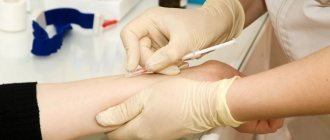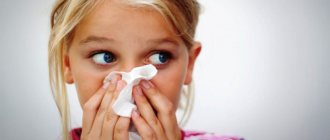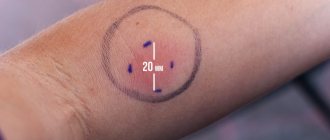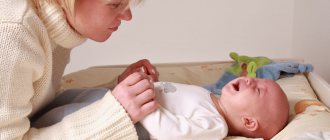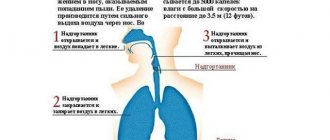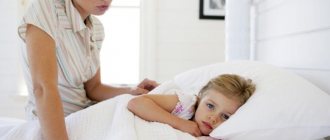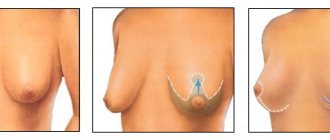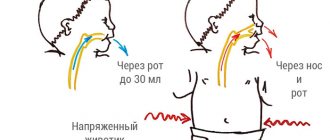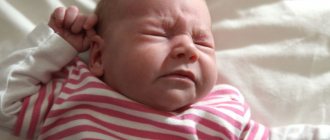Hello, dear readers of our site! Today we will look at what to do if a child gets sick after Mantoux. There are several reasons that parents need to be aware of to keep their children safe. This will help avoid complications and properly prepare for vaccination.
Many parents mistakenly call Mantoux a vaccine. In fact, the injection is a way to diagnose tuberculosis in young children.
Why is the Mantoux reaction done?
Many parents mistakenly call Mantoux a vaccine. In fact, the injection is a way to diagnose tuberculosis in young children. This is due to the impossibility of performing fluorography, which produces dangerous x-ray radiation on the developing organism. Using a syringe, the doctor introduces a special composition containing weakened pathogens.
The purpose of the Mantoux test is to obtain a response. When tuberculin is administered, the baby's body encounters the tuberculosis bacillus. If he has not previously been in contact with the virus, then the immune system has practically no resistance and does not react with redness. If signs of infection or dead mycobacteria are present in the blood, a red spot, swelling or papule appears at the injection site. By its size, the doctor can judge the risk of infection of the child.
In recent years, the number of people suffering from various forms of tuberculosis has increased sharply. Therefore, doctors do not recommend abandoning the Mantoux test. But adults should know the basic principles of diagnosis and possible consequences so as not to panic.
Why do children get sick after Mantoux?
The Mantoux test is not a vaccination containing live bacteria. Therefore, the risk of getting tuberculosis after injection is minimal. But sometimes there is a sharp increase in temperature and other symptoms characteristic of inflammation or ARVI. In most cases, the reason lies in improper preparation. Ideally, each baby should be carefully examined by a pediatrician, given a referral for general tests, and made sure there are no signs of influenza or other infectious diseases. Only after this is permission given to carry out the reaction.
In fact, due to lack of time, doctors miss important symptoms, which is fraught with complications. Among the possible reasons why the child fell ill after Mantoux are the following:
- The baby’s immunity is weakened by a recent acute respiratory infection, influenza or more serious inflammation occurred in a latent form.
- The baby has autoimmune diseases that were not previously diagnosed. Some children naturally have a lower level of lymphocytes, which are responsible for the formation of natural defenses, and there is a pathology of the thymus gland.
- Nutrition does not correspond to age in terms of the amount of vitamins and microelements; there is a lack of body weight, vitamin deficiency, and anemia.
- A few days before visiting the vaccination office, teeth began to emerge, and there were wounds or open erosions on the gums.
Can a child get sick after receiving a Mantoux vaccination? One of the reasons that doctors do not talk about is violation of the rules for storing and transporting the vaccine. Normally, it should constantly be at a certain temperature. Otherwise, a chemical reaction begins and the drug deteriorates. As a result, allergies and complications develop in the child’s body.
Can a child get sick after receiving a Mantoux vaccination? One of the reasons that doctors do not talk about is violation of the rules for storing and transporting the vaccine.
Emergency in Primorye: children fell ill after the Mantoux test due to an overdose
The mother of one of the victims, Elena Sviridova, told a RIA Novosti correspondent that she knew nothing about the fact that her child would be given a Mantoux test, or even that her child was in the hospital. According to her, the day after vaccination, most of the children were collected at school and, without warning their parents, taken to the hospital.
“We were not warned about the arrival of doctors or any vaccinations. When we asked for an explanation, the entire school administration said that they did not know where the doctors came from or why <...> My child was vomiting in the evening, other children showed different symptoms, fever, many children could not sleep from the fever,” - says Sviridova.
A representative of the Primorsky Territory Health Department confirmed to RIA Novosti that Mantoux tests without parental consent are a violation of the established procedure, since parents have the right to refuse.
“The situation is very difficult. Children were tested without parental permission, but this should not be the case. Before carrying out any medical procedure on schoolchildren, school management, as well as doctors, had to warn parents several days in advance. They, in turn, had to confirm in writing or refuse this procedure,” he said.
The school itself could not be reached for comment. A school representative told RIA Novosti that the director was absent from work, but other school employees declined to comment.
The prosecutor's office speaks of an overdose and checks the quality of the drug
According to the regional prosecutor's office, the cause of the children's illness was the excess dose of the drug that was administered to them.
“A pediatrician from the Yakovlevsky Central District Hospital, together with a nurse from the same hospital, carried out tuberculin diagnostics with the drug “tuberculin” in excess of the permissible doses for 45 students at a school in the village of Novosysoevka,” the prosecutor’s office reports.
In connection with the incident, the department reports, the medical workers who carried out the vaccination and the parents of the students were interviewed, and a full list of children who were tested was established (at first they talked about 43 schoolchildren, then about 45).
In turn, the regional health department checks the vaccine that was administered to children.
“The department is conducting an investigation into the hospitalization of children after vaccination with the traditional drug “tuberculin.” Experts check the quality and its compliance, how the vaccine was stored and transported, as it could have deteriorated due to this. The actions of the doctor and two nurses who performed Mantoux tests are also being checked,” a department representative told RIA Novosti.
Can tuberculosis occur after the Mantoux test?
This question worries many parents. When a high temperature appears after the injection, they begin to panic, suspecting the development of a dangerous disease. But drug manufacturers and pediatricians assure absolute safety. Before introduction, all viruses undergo multi-stage processing:
- the drug is heated so that the pathogens die;
- an acid solution cleans the vaccine from remnants of active bacteria;
- The solution is additionally sterilized with ethanol.
Therefore, after Mantoux, there were no officially recorded cases of a small patient falling ill with tuberculosis. But often there is increased sensitivity to one of the components, which parents mistakenly mistake for a disease.
If a child gets sick after trying mantoux
When performing a Mantoux test on a weakened baby, a number of symptoms may be observed during the day or the next day:
- body temperature rises sharply;
- fever, body aches;
- refusal of food and sweets;
- the baby sleeps a lot, does not play with his favorite toys;
- rashes or redness of the skin appear.
If an individual reaction to components or tuberculin manifests itself in this way, well-being quickly returns to normal. It is necessary to give more drinks, tea or unsweetened fruit drink to remove toxins. For low-grade fever, the use of antipyretic drugs is not required. The exception is children who have previously had seizures.
Some babies experience a specific reaction that should be reported to your doctor:
- the temperature begins to rise only after 2–3 days;
- the sample injection site is itchy;
- The “button” grows over 12–15 mm.
This may result in a positive reaction to the tuberculosis virus. You should not panic or hide your symptoms: often the test gives false results, but a full consultation with a phthisiatrician is necessary. If the reason lies in an allergy to the components, it is subsequently replaced with Diaskintest or other methods of diagnosing the disease.
If within 1–2 days the temperature rises above 38°C, you must call a doctor. It is necessary if specific symptoms are observed:
- red rash on the body;
- increased breathing;
- wheezing;
- coughing;
- swelling of the face or limbs;
- diarrhea or flatulence.
The pediatrician must examine the child, examine the throat, listen to breathing, and suggest how to treat the inflammation. In the vast majority of cases, the cause is hidden in the activity of aerobic viruses. The first step is to give the baby an antihistamine. It relieves swelling of the larynx and prevents shortness of breath, which is dangerous for the baby. The most commonly recommended are Zyrtec, Loratadine, Claritin in the form of syrup or tablets.
The issue of using an antiviral agent is decided individually. Many doctors believe that taking interferon-based drugs can dull the effect of the Mantoux test. If the baby’s body is infected with tuberculosis, a false-negative test will lead to late diagnosis, increasing the risk of developing a dangerous disease.
Can a child get sick after Mantoux?
The Mantoux test is an immunological test aimed at determining the degree of intensity of anti-tuberculosis immunity. The absence of a reaction indicates that the child does not have specific immunity and is not protected from a terrible disease. On the contrary, an overly pronounced response indicates excessive activity in the body, which is a sign of the development of tuberculosis. Regular examinations using the Mantoux method help assess the readiness of the immune system to resist infection and identify the fact of infection in the early stages, when antibacterial therapy promotes recovery as soon as possible, without the development of complications.
The allergy test is not a mandatory screening test and is carried out only with the permission of parents or other official representatives. But by signing a documentary refusal of the procedure, they put the baby in danger, eliminating the chance to detect tuberculosis in time and begin treatment when medications are effective.
Depending on the intensity of the manifestation, the skin reaction can be positive or negative, and also doubtful (when it is difficult to interpret the result) or hyperergic (too pronounced, most likely indicating the fact of infection).
After a tuberculin test, the child may experience the following phenomena:
- hyperthermia;
- cough;
- runny nose;
- a sore throat.
However, the reason lies not in the administration of tuberculin, but in the fact that there was a virus in the little patient’s body.
Before vaccination or any injection test, the baby must be carefully examined by a pediatrician, who will allow the procedure to be carried out if he finds no contraindications and determines that the child is absolutely healthy.
Main reasons why this can happen
If a child gets sick after Mantoux, the reasons are probably:
- severely weakened immunity;
- There are not enough nutrients in the diet;
- the daily routine is incorrectly drawn up or not followed;
- lack of physical activity;
- teeth are being cut;
- the drug is expired.
When the immune system is weakened, the protective forces are reduced even more after Mantoux is administered. Because of this, the child becomes more vulnerable to various infections. Contact with the virus on a playground or in a store - and now the baby is already sick.
Only a specialist can determine what could cause a child to get sick after a Mantoux vaccination. He will conduct an examination, analyze the patient’s condition and prescribe additional examination.
How to prevent complications?
The Mantoux test is well accepted by the body and rarely produces side effects or complications. But what should parents do to prevent such health problems after vaccination?
- Be sure to do basic blood and urine tests and determine your hemoglobin level.
- Show the child to the pediatrician, monitor the examination and enter data into the card.
- For 4–5 days before the injection, avoid visiting crowds of people and shops. If possible, do not take your child to playgrounds.
- After consulting with your doctor, you can give an antihistamine.
A little prevention will several times reduce the risk of your baby becoming infected with ARVI or influenza and will help you recover faster after the test.
So, we figured out what to do if a child gets sick after Mantoux. Adults should carefully monitor the body's reaction, support the body with vitamins and proper nutrition. What symptoms or complications did your baby experience after tuberculin administration? Subscribe to our blog and share your own experiences with readers in the comments below.
And be healthy!
What to do when a child gets sick after a Mantoux test
To avoid getting sick, prevention is necessary. Yes, it is much easier to prevent an infection than to cure it.
Precautionary measures are very simple and consist of preventing the risk of infection. It consists of two factors: the environment and pathogenic microorganisms in it. If nothing can be done from the second point naturally (in such cases only artificial vaccinations help: for example, Mantoux against tuberculosis), then we can still fight the first.
Precautionary measures:
- Avoid hypothermia.
- Sunbathing, contrast showers, sports: all this will only be beneficial.
- Do not walk in crowded places (the likelihood of infection is much higher).
- Avoid contact with sick people.
- Boost your immunity with fruits.
If your child is sick, look at the temperature! Low-grade fever means that everything will go away on its own after a few days. Above 37.5°C makes one think about a serious illness due to an additional infection (the cause is not tuberculosis).
In this case, consult a doctor to avoid consequences!
Actions that are unacceptable:
- Do not give your baby antipyretics after vaccination.
- Treating it with other drugs is a bad idea.
- Do not give Cytovir, which would do a great job against flu and colds. Everything will happen without your intervention.
